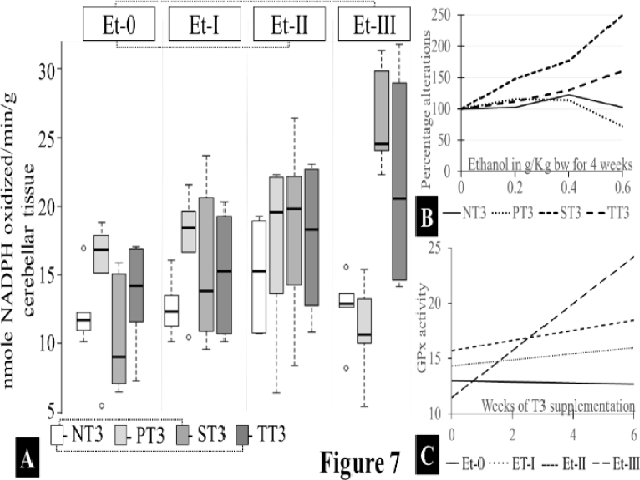Evaluation of Varied Modalities of Tocotrienol Supplementations to Counter the Cerebellar Oxidative Stress Caused by Low-to-moderate Doses of Ethanol in Rats
Abstract
Background and Objectives: Self-intoxication with Ethanol (Et) is a common problem worldwide. Being a psychoactive drug, neurotoxic effects of Et are well known. Cerebellum is highly vulnerable to Et exposure. Tocotrienols (T3) are relatively rare components of vitamin E and have the potential to prevent the oxidative stress and act as neuroprotective. Varied modalities of T3 supplementations were evaluated to identify the possibilities of countering cerebellar oxidative stress caused by low-to-moderate doses of Et exposure. Methods: Four phase of experiments were carried out with nil (Et-0) and three doses of Et exposures (Et-I, Et-II and Et-III) for 4 weeks. In each phase, 4 groups of Wistar rats were maintained with sham supplementation (NT3), Prior Supplementation (PT3), Simultaneous Supplementation (ST3) and Total Supplementation (TT3) with T3 for 6 weeks. Cerebellar levels of reduced Glutathione (GSH), Lipid Peroxidation (LPO) and activities of catalase, Superoxide Dismutase (SOD), Glutathione Peroxidase (GPx) and Glutathione Reductase (GR) were estimated and Superoxide and Peroxide Handling Capacities (SPHCs) were calculated. Results: All the tested cerebellar oxidative stress parameters and handling capacities were significantly influenced by the modalities of T3 supplementation. However, low-to-moderate doses of Et exposures contributed significantly in alterations of LPO level, GPx activity, GR activity and glutathione-dependent SPHC of cerebellum. Conclusion: Critical evaluation of studied parameters suggest insufficient overall performance of ST3 type of supplementation, whereas, TT3 type of supplementation was the best among the modalities of T3 supplementation. However, excess T3 supplementation may not be beneficial in some cases of oxidative stress parameters and SPHC of cerebellum.


This work is licensed under a Creative Commons Attribution-NonCommercial-NoDerivatives 4.0 International License.





